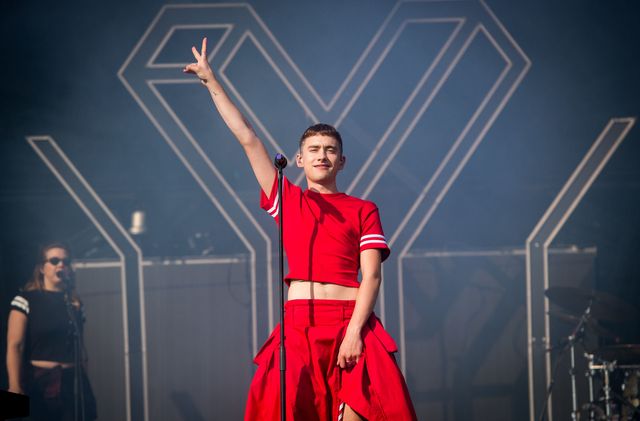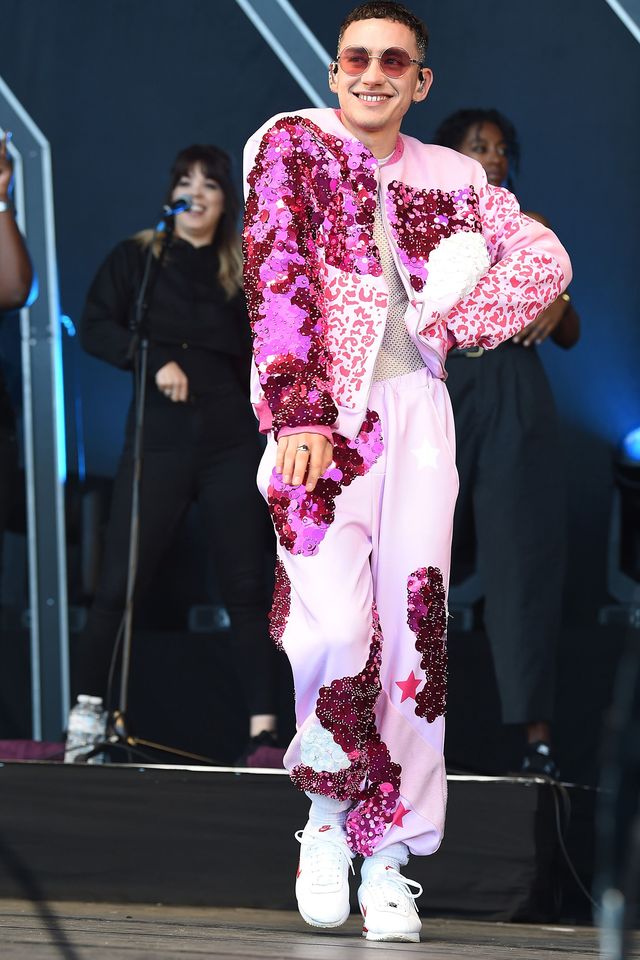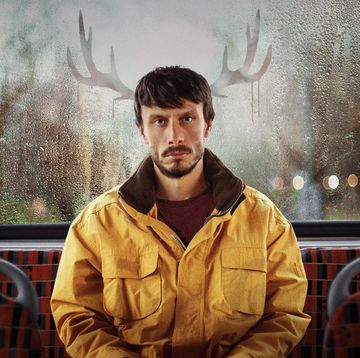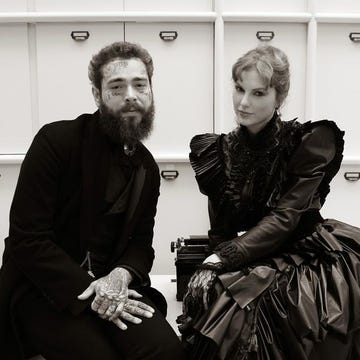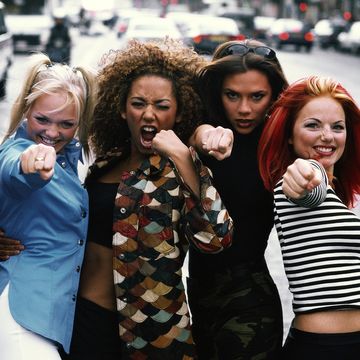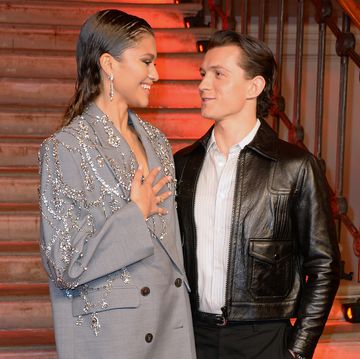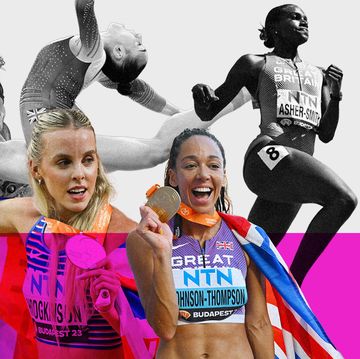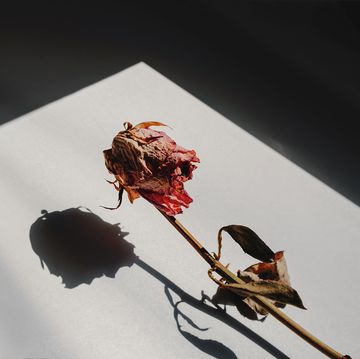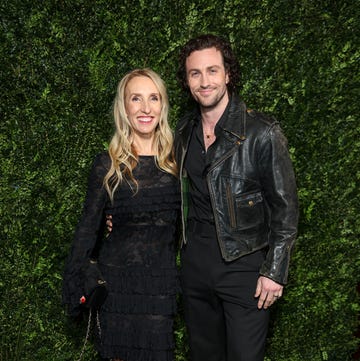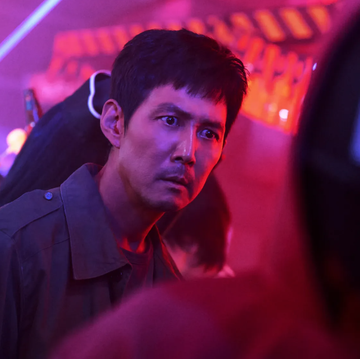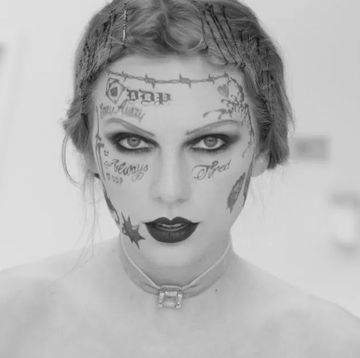For Years & Years' new single, "Sanctify," frontman Olly Alexander channeled two religious inspirations: the church and Britney Spears. The former is a no-brainer given the title alone, and as for the latter, he explains with a laugh, "I just wanted it to be a really cool pop song that Britney would have done."
Though the single may sound reminiscent of "I'm a Slave 4 U," it has deeper meaning than most cookie-cutter pop. To start, it juxtaposes a traditionally uncommon pair, homosexuality and holiness, by characterizing being gay as a sacred act rather than the archaic view that it's a sin. ("Sanctify my sins when I pray," the chorus rings.)
"I make holy my sinfulness when I pray," 27-year-old Alexander explains to BAZAAR.com. "And that's alluding a little bit to being on your knees, for whatever reason, but also that being gay is also a blessing. It shouldn't be viewed as something sinful."
Since Years & Years came on the scene in 2014, Alexander has used pop music (or at least his dark, electro-inspired take on it) as a medium for expressing his sexuality. "Being able to have a platform where I can express my gay self is just really wonderful, and I feel grateful," he says.
With that platform, Alexander sheds light on others' gay experiences in addition to his own, and not only through music. In 2017, he released a BBC Documentary, Growing Up Gay, which shed light on mental health issues among LGBTQ youth. As someone who's struggled with anxiety and depression, the singer worked with a subject close to home.
"[Mental health] is still so heavily stigmatized that I think anything that can be done to break down that barrier and encourage people to talk is a good thing," he says in his soft voice, juxtaposed by very loud clothes (a bright yellow t-shirt, overalls, and a color-blocked Tommy Hilfiger puffer to match his cherry-red hair). "Now I want to inspire other people to be themselves and not be afraid," he adds.
"Sanctify" also ushers in a new chapter for Years & Years, who made a sublime debut with their album Communion in 2015. For their sophomore record, Alexander was inspired by artists like David Bowie, Prince, and even Lady Gaga, who've created imaginary worlds to go along with their music. The fantastical "Sanctify" music video—which stars Alexander as a human used for entertainment in an android society—is just a glimpse into Years & Years' magical universe.
Below, Alexander talks the band's new single, his obsession with religious iconography, and Years & Years' new era.
"Sanctify" is about being with straight men.
"I wanted to write a song about my experiences with straight guys, because I know a lot of other gay guys will relate to this. I think the first guy I ever fell in love with was a straight guy at my school, and since then, I've had lots of different relationships. But when I wrote the song I was just newly single and I, again, had this encounter with a guy who was identifying as straight but was not behaving so straight when he was with me.
"That was a lot of struggle going on there and the relationship created a lot of conflict. But I was interested in how, for this guy struggling so much with their sexuality, I became this kind of saint and sinner, good and evil person, because I was helping this guy explore the sides of their sexuality they felt they couldn't, but also, I was leading them down the path to sinfulness and, like, deviancy. That's kind of inspired the song. There's a lot of coded language in there, which I think a lot of people probably wouldn't pick up on. I always love codes and hidden meanings."
Alexander hasn't kept in touch with the former hookup that inspired the song.
"I suspect that they still identify primarily as straight. I think especially for men, we do have a hyper masculine culture that doesn't really allow men to be anything other than straight—unless they're gay—and there's not really much between that. But of course, sexuality is a spectrum, and I think lots of straight guys would love to explore that side of their sexuality, but feel that they can't because there is so much stigma around it. I hope that this guy and whoever is in that situation feels more empowered to explore that side of themselves, because life's short."
He's come a long way to reach this point of self-acceptance and empowerment, but still has moments of insecurity.
"It's for sure been a journey. I think a lot of gay and queer people grow up in a culture that makes them feel ashamed of themselves and ashamed of their bodies and ashamed of their desires. That's a very powerful emotion that stays with you for a very, very long time. I still feel like I have that within me. I noticed I was afraid to, when I was in a relationship, kiss my boyfriend in the back of a taxi because I was scared of the driver's judgment. That kind of stuff still exists for me, but at the same time, I'm at a place now where I'm so happy to be gay."
His fans inspire him to openly embrace his identity even more.
"The level of support and reaching out that I've experienced from fans of the music, it's been so overwhelming, and it's also made me feel like, 'Maybe it's okay for me to be a little bit louder about the subject or be a little more confident on stage,' because you're receiving all this support all the time. It's very inspiring. Now I want to inspire other people to be themselves and not be afraid. It's this crazy two-way symbiotic relationship, which I would never have imagined would be the case before Years & Years became a thing. It's wild, really."
While he's proud that the public continues to embrace the LGBTQ community, he acknowledges that we've still got a long way to go, especially when it comes to representation.
"The LGBT community is unique because it encompasses so many different, diverse identities and experiences. It encompasses so many intersectional identities and unfortunately, the predominant narrative is the white, gay dude. I am part of that narrative. For me, it's been important to acknowledge that and as much as possible, direct people to the voices of people of color or trans women. Just encouraging people to share the platform that I've been given. Also, I think we have a long way to go to really understand the different kind of experiences that our community has within it.
"There's a lot to be proud of and a lot we can feel good about. Visibility is super important, but the moment we go, 'Everything's fixed now because we're in 2018,' we're kind of deluding ourselves. We know statistically that LGBT people are more likely to suffer mental distress or have more difficult access to health care they need. In the U.K., rates for young trans people for suicide are like 70 percent. That's attempted suicide. That is a glaring statistic."
But he's hopeful.
"I think young people—and I've seen this through the band and fans of the band—are much more willing to engage with, for instance, intersectionality, and understanding different identities and they're more willing to try and understand that. I have confidence in the future. I think I'm more positive and definitely optimistic than I am negative."
Alexander ensures that he promotes intersectional visibility in his own music videos, like "Desire," which celebrates "all different kinds of sexuality," and "Worship," which includes diverse queer creatives.
"I'm not about to tell anybody how they should make their music video, but literally, you get to pick who's in your music video. You can actually make that decision. I was like, "We're going to make sure we have as diverse a cast as possible." And that doesn't just mean people of color or trans people, it means people who aren't able-bodied or people of different body types, and trying to incorporate that into a music video is not super difficult. You can just cast those people. Not always—sometimes it is a challenge, and diversity as tokenism is really upsetting and I don't like that either. It's not my place to speak on anybody else's experience. At the end of the day I can only speak about my own, but I think if I get to make music videos I may as well just try and get as many people as possible involved and that has been a conscious decision."
Years & Years' next album is almost done, and it includes a common theme of being frustrated with "dudes."
"The album is pretty much finished. I realized when I was looking at all the track listing, I was like oh, all these songs are just about me being angry at dudes. Just like general dudes. Just guys that I've slept with that annoyed me, my exes, my dad. Just dudes that piss me off."
He wrote the songs post-breakup.
"This album's like me being kind of heartbroken and sad. I was newly single and I was like, 'Okay, got to write an album now.' I was kind of starting from scratch and I realized I had this anger about a load of situations, so that went into a lot of the songwriting. Even though I wouldn't say any of the music is super angry, it's a bit more direct or confessional than the first one."
Alexander channeled pop divas in the recording booth.
"I just love pop music. I wanted to make really fun pop music. Every time I would be in the studio I would be like, 'What would Britney or Christina have done?' Combine that with a Joni Mitchell song or a Rihanna song. They're all goddesses that I just am poorly imitating. It's a good inspiration."
With song titles like "Sanctify" and "Worship" and a debut album called Communion, Alexander loves religious references.
"Religious iconography is such a goldmine for me in terms of it's so dramatic. Madonna has a lot to answer for this—I just think she's incredible. My first-ever job was in this store called Moonstones and they sold gemstones and incense and candles and also bongs. I had this real attraction to spirituality at that age and I was like 14. I believed in magic and I still, in a different way, believe it now. I just find it fun to live in that space of spirituality meets reality."
He wasn't raised religiously but living near a church as a child had an effect on him.
"When I was eight years old, we lived in a house that was backed onto a churchyard, it was next to a big church and so I would have these really weird dreams that there were these spirits from the churchyard speaking to me.
"Me and my friends would play in the churchyard all the time so we're in the shadow of this big church. It definitely had a profound effect on me because even though I wasn't religious, I was really fascinated by the whole ceremony and grandeur of being inside a church and lighting the candles and it just felt magical. So I just cherry-picked the things I thought were cool. I'm so sorry, I don't want to offend anybody who has a faith background. I respect that."
His unabashed self-expression also manifests in his wardrobe, ranging from pops of bold color to head-to-toe sequined ensembles (like that Swarovski crystal-covered jumpsuit in the "Meteorite" video).
"I always have fun with clothing as self expression and I know now everybody wants to express themselves through what they wear, or the way they look, but I've just always been someone that's gone out of my way to do that. When I was 13, I was wearing eyeliner to school and wearing choker necklaces.
"When I was that age, it was about trying to find an identity, but now, I think I like having fun with what I wear. Now, I'm trying to find clothes that feel less gendered and that's why I'm wearing overalls or jumpsuits or shoes with a heel. I just think it's a reflection of how I'm feeling at any time. Also, I'm a performer, so it's all about costume as well. I think what you wear is a costume anyway, just in your daily life. You may as well put on something that makes you feel good.
"You look around and, say you're waiting for the train or subway, and everyone's in gray and black. And I get it; you don't want to have to think about what you wear all the time. But equally, I think you could be wearing so many fun things and expressing yourself through what you wear. It's not about looking cool or looking fashionable, it's just communicating something from within yourself. I think color is really powerful. If I've gotten something that's colorful, I just feel better.
This interview was edited and condensed for clarity.
